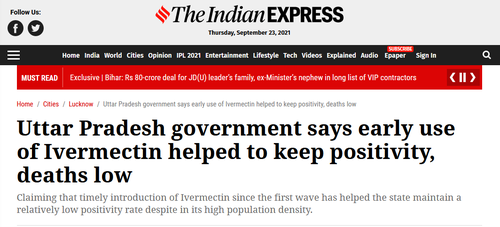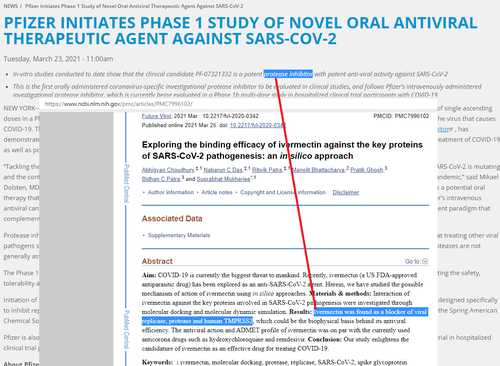Hospitalizations, Mortality Cut in Half after Brazilian City Offered Ivermectin to Everyone Pre-Vaccine

All Global Research articles can be read in 51 languages by activating the “Translate Website” drop down menu on the top banner of our home page (Desktop version).
To receive Global Research’s Daily Newsletter (selected articles), click here.
Visit and follow us on Instagram at @crg_globalresearch.
***
Early on in the pandemic, before the vaccines were available, the Southern Brazilian city of Itajai offered Ivermectin as a prophylaxis against the disease.
Between July and December of 2020, roughly 220,000 people were offered a dose of 0.2mg/kg/day (roughly 18mg for a 200lb person) as an optional treatment for 2 days, once every two weeks.
133,051 people took them up on it, while 87,466 did not.
After analyzing the data, a team of researchers spanning several Brazilian institutes, the University of Toronto, and Columbia’s EAFIT concluded in a December pre-print study that hospitalization and mortality rates were cut in half over the seven month period among the Ivermectin group.
This is even more impressive when you learn the IVM users were older on average, with 30% >50 yo versus 20% for non-IVM users. The mortality reduction is even higher looking at different age groups. 85% for 31-49 yo and 59% for >50 yo. pic.twitter.com/K6D5naybCS
— Simon Vallée (@sival84) December 11, 2021
The authors adjusted for relevant confounding variables, including age, sex, medical history, previous diseases, and other conditions.
The analysis contradicts an October report by Business Insider which claims, based on a Brazilian ICU doctor’s anecdotal evidence, that the experiment was a failure.
Study limitations:
The authors note, “Being a retrospective observational analysis, it is uncertain whether results would be reproducible in a randomized, placebo-controlled, double-blind clinical trial, but likely, since groups of ivermectin users and non-users had similar demographic characteristics, and rates were adjusted for the relevant confounding variables.”
We’re sure the ‘fact checkers’ are already hard at work trying to debunk the pre-print, however they may also want to take a look at ivmmeta.com – a real-time meta analysis of 70 studies which found that Ivermectin works as a prophylaxis 83% of the time. In peer-reviewed studies, it was found effective 70% of the time as an early treatment, and just 39% of the time as a late treatment.
As we noted during the whole ‘horse paste’ controversy:
Ivermectin
This widely prescribed anti-parasitic which is also used in horses has shown meaningful efficacy worldwide in the treatment of mild and moderate cases of Covid-19, plus as a prophylactic. India’s Uttar Pradesh province, with a population of over 200 million, says that widespread early use of Ivermectin ‘helped keep positivity [and] deaths low.’

Separately, there have been several studies funded by the Indian government, primarily conducted through their largest govt. public medical university (AIIMS).
- Role of ivermectin in the prevention of SARS-CoV-2 infection among healthcare workers in India: A matched case-control study (source)
Conclusion: Two-dose ivermectin prophylaxis at a dose of 300 μg/kg with a gap of 72 hours was associated with a 73% reduction of SARS-CoV-2 infection among healthcare workers for the following month.
- Ivermectin as a potential treatment for mild to moderate COVID-19 – A double blind randomized placebo-controlled trial (source)
Conclusion: There was no difference in the primary outcome i.e. negative RT-PCR status on day 6 of admission with the use of ivermectin. However, a significantly higher proportion of patients were discharged alive from the hospital when they received ivermectin.
- Clinical Research Report Ivermectin in combination with doxycycline for treating COVID-19 symptoms: a randomized trial (source, double-blind randomized, peer-reviewed)
Discussion: In the present study, patients with mild or moderate COVID-19 infection treated with ivermectin in combination with doxycycline generally recovered 2 days earlier than those treated with placebo. The proportion of patients responding within 7 days of treatment was significantly higher in the treatment group than in the placebo group. The proportions of patients who remained symptomatic after 12 days of illness and who experienced disease progression were significantly lower in the treatment group than in the placebo group.

- Sharp Reductions in COVID-19 Case Fatalities and Excess Deaths in Peru in Close Time Conjunction, State-By-State, with Ivermectin Treatments (source, peer-reviewed, University of Toronto, Universidad EAFIT)
For the 24 states with early IVM treatment (and Lima), excess deaths dropped 59% (25%) at +30 days and 75% (25%) at +45 days after day of peak deaths. Case fatalities likewise dropped sharply in all states but Lima
- The effect of early treatment with ivermectin on viral load, symptoms and humoral response in patients with non-severe COVID-19: A pilot, double-blind, placebo-controlled, randomized clinical trial (source, University of Barcelona, peer-reviewed)
Findings: Patients in the ivermectin group recovered earlier from hyposmia/anosmia (76 vs 158 patient-days; p < 0.001).
Bengladesh:
- A Comparative Study on Ivermectin-Doxycycline and Hydroxychloroquine-
Azithromycin Therapy on COVID-19 Patients (source – peer reviewed, though not govt funded)
Conclusion: According to our study, the Ivermectin-Doxycycline combination therapy has better symptomatic relief, shortened recovery duration, fewer adverse effects, and superior patient compliance compared to the Hydroxychloroquine-
Azithromycin combination. Based on this study’s outcomes, the Ivermectin-Doxycycline combination is a superior choice for treating patients with mild to moderate COVID-19 disease.
- A five-day course of ivermectin for the treatment of COVID-19 may reduce the duration of illness (source, peer-reviewed double blind randomized, though small sample size)
Discussion: A 5-day course of ivermectin resulted in an earlier clearance of the virus compared to placebo (p = 0.005), thus indicating that early intervention with this agent may limit viral replication within the host. In the 5-day ivermectin group, there was a significant drop in CRP and LDH by day 7, which are indicators of disease severity.
Why does Ivermectin, a ‘horse dewormer’ work? For starters, it’s a protease inhibitor. Interestingly, Pfizer’s 2x/day Covid-19 prophylactic they’re trialing right now is also a protease inhibitor.

Perhaps the most damning evidence in favor of Ivermectin is the medical establishment’s position that it’s essentially snake oil, despite the fact that it’s had a glowing safety profile for decades, until now.
*
Note to readers: Please click the share buttons above or below. Follow us on Instagram, @crg_globalresearch. Forward this article to your email lists. Crosspost on your blog site, internet forums. etc.

